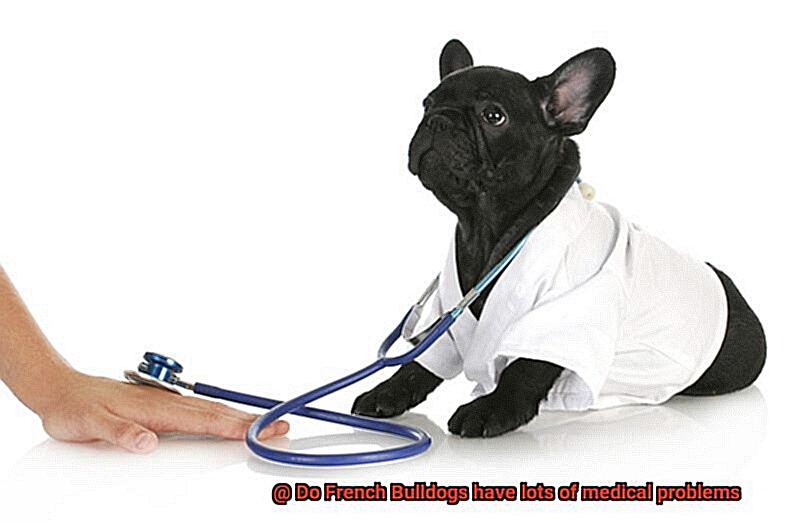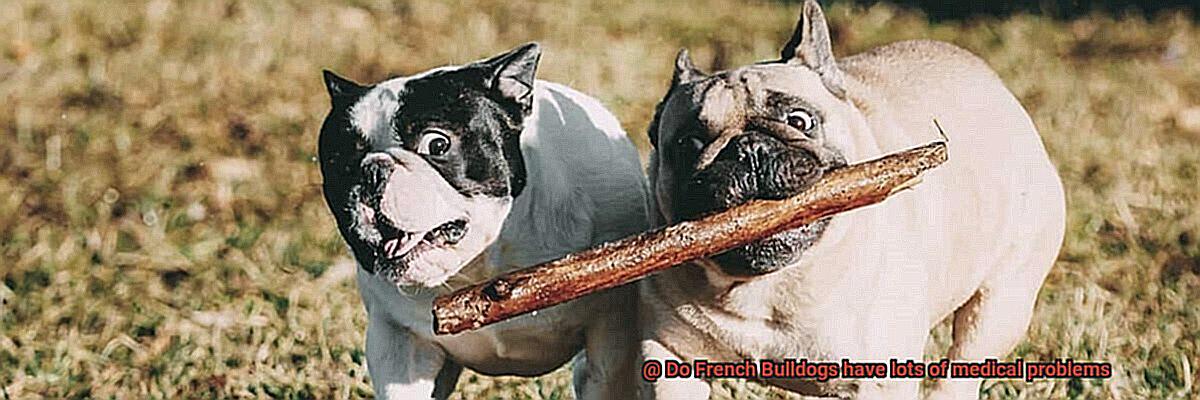Do French Bulldogs have lots of medical problems?
French Bulldogs, with their irresistible charm and playful spirit, have skyrocketed in popularity as beloved family pets. But beneath their endearing wrinkles and bat-like ears lies a breed that unfortunately grapples with a slew of medical troubles.
While Frenchies are undeniably fantastic companions, it’s crucial for potential owners to be well-informed about the health risks associated with these adorable pooches. In this blog post, we’ll dive deep into the common medical woes that often plague French Bulldogs, uncovering the causes and consequences along the way.
So, buckle up and join us on this exploration of French Bulldog health – let’s discover how we can best support these lovable companions.
Brachycephalic Airway Syndrome (BAS): A Common Health Issue in French Bulldogs
Contents
- 1 Brachycephalic Airway Syndrome (BAS): A Common Health Issue in French Bulldogs
- 2 Respiratory Issues: Snoring, Wheezing, and Reverse Sneezing
- 3 Heatstroke: The Risk of Overheating for French Bulldogs
- 4 Skin Problems: Allergies, Dermatitis, and Infections
- 5 Eye Conditions: Cherry Eye, Dry Eye Syndrome, and Corneal Ulcers
- 6 Orthopedic Issues: Hip Dysplasia and Intervertebral Disc Disease
- 7 Genetic Disorders in French Bulldogs
- 8 Tips For Maintaining the Health of Your French Bulldog
- 9 Conclusion
If you’re a proud owner of a French Bulldog, you may already be familiar with their unique appearance and lovable personality. But did you know that these adorable pups are prone to a common health issue called Brachycephalic Airway Syndrome (BAS)? In this article, we’ll explore what BAS is, how it affects French Bulldogs, and what you can do to help your furry friend.
Understanding Brachycephalic Airway Syndrome
Brachycephalic Airway Syndrome, or BAS for short, is a condition that affects dogs with a characteristic short and flattened skull shape, like French Bulldogs. This unique anatomical feature can lead to several respiratory problems that impact their ability to breathe properly.
The Anatomy of French Bulldogs and BAS
French Bulldogs have a few anatomical features that contribute to the development of BAS. These include their short snouts, narrow nostrils, and elongated soft palates. While these features certainly add to their cuteness, they can also make it difficult for them to breathe efficiently.
Signs and Symptoms of BAS in French Bulldogs
Spotting the signs of BAS in your French Bulldog is crucial for early intervention and treatment. Some common symptoms include difficulty breathing, noisy breathing (think snorting and wheezing), coughing, exercise intolerance, and overheating. If you notice any of these signs in your furry friend, it’s essential to seek veterinary care as soon as possible.
Impact on Quality of Life
BAS can significantly impact the quality of life for affected French Bulldogs. Breathing difficulties can cause respiratory distress and limit their physical activity. In severe cases, BAS can even lead to life-threatening complications such as heatstroke and collapse. It’s important to take this condition seriously and provide the necessary care and support for your pup.
Treatment Options for BAS
The good news is that there are treatment options available to help alleviate the symptoms of BAS in French Bulldogs. Lifestyle modifications can make a big difference, such as avoiding strenuous exercise and keeping your pup cool in hot weather. In some cases, surgical interventions may be necessary to correct anatomical abnormalities. Common procedures include widening of the nostrils (nares), removal of excess tissue from the soft palate, and repositioning of the laryngeal saccules.
Prevention is Key
Preventing BAS in French Bulldogs starts with responsible breeding practices. Selecting breeding pairs with healthier airway structures can help reduce the prevalence of this condition.
If you’re considering getting a French Bulldog, be sure to choose a reputable breeder who prioritizes the health and well-being of their dogs.
Respiratory Issues: Snoring, Wheezing, and Reverse Sneezing
French Bulldogs are irresistible with their adorable looks and playful personalities. However, they are notorious for their respiratory issues, including snoring, wheezing, and reverse sneezing. In this article, we will dive into the reasons behind these problems and provide insights on how to manage them effectively.
Snoring: The Nighttime Symphony
French Bulldogs are champions in the snoring department. Their unique anatomy, with a brachycephalic (short-muzzled) face, leads to a shortened airway. When they sleep, the airflow through their narrow nasal passages and throat becomes obstructed, resulting in the infamous snoring sound. Though it may seem harmless, snoring can indicate underlying respiratory problems that require attention.
Wheezing: The High-Pitched Whistle
Wheezing is another common respiratory issue in French Bulldogs. It manifests as a high-pitched whistling sound during breathing and can be accompanied by difficulty breathing. This occurs when there is partial blockage or constriction in the airways, leading to turbulent airflow. Inflammation, allergies, or anatomical abnormalities can contribute to wheezing.
Reverse Sneezing: The Peculiar Phenomenon
The reverse sneeze is a phenomenon that often perplexes French Bulldog owners. It involves sudden and forceful inhalations accompanied by snorting or gagging sounds. This occurs due to irritation or spasm of the soft palate and throat tissues. Excitement, exercise, allergies, or even minor irritants like dust or pollen can trigger reverse sneezing.
Managing French Bulldog’s Respiratory Issues
While these respiratory issues may be common in French Bulldogs, there are ways to manage them effectively:
- Lifestyle modifications: Using humidifiers to moisten the air can help alleviate symptoms and reduce snoring. Limiting exposure to respiratory irritants, such as smoke or strong fragrances, can also be beneficial.
- Regular veterinary check-ups: Routine visits to the veterinarian are essential for monitoring your French Bulldog’s respiratory health. Your vet will evaluate the airway, identify any abnormalities, and recommend appropriate treatments.
- Surgical intervention: In severe cases, surgical correction of structural issues contributing to respiratory problems may be necessary. Your veterinarian will determine if this is the best course of action for your furry friend.
Heatstroke: The Risk of Overheating for French Bulldogs
We all know that these little bundles of joy are not just dogs, they are family. But did you know that their unique features make them more prone to overheating? That’s right. In this article, we’ll explore the risks of heatstroke for French Bulldogs and give you some pawesome tips to keep your furry friend cool and safe. Let’s dive in.
Why French Bulldogs Are at Risk
- Brachycephalic Breeds: French Bulldogs are part of a group called brachycephalic breeds, which means they have short, flat faces. This cute feature comes with a price – it makes them more susceptible to overheating.
- Respiratory Challenges: Their adorable smushy faces come with narrow airways and smaller nostrils, making it harder for them to regulate their body temperature efficiently. Panting, the main cooling mechanism for dogs, becomes less effective for French Bulldogs.
Signs and Symptoms
- Pay Attention: As responsible owners, it’s crucial to be aware of the signs of heatstroke in your French Bulldog. Excessive panting, drooling, rapid breathing, weakness, vomiting, diarrhea, collapse – these are all red flags that your furry friend is in danger.
- Don’t Ignore It: Heatstroke is a serious condition that can lead to seizures and even death if not addressed promptly. So don’t delay – take action immediately if you suspect your French Bulldog is suffering from heatstroke.
Prevention is Key
- Shade and Water: Make sure your French Bulldog has access to shade and fresh water at all times, especially during hot weather. Create cool spots in your home or yard where they can retreat to when the temperature rises.
- No Hot Walks: Avoid exercising your French Bulldog in extreme heat. Instead, opt for early morning or late evening walks when it’s cooler. Remember, a tired dog is a happy dog, so find indoor activities to keep them entertained during the hottest parts of the day.
- Cooling Options: Provide your pup with cooling options like wet towels or cooling mats. These can help lower their body temperature and provide much-needed relief from the heat.
When Heatstroke Strikes
Skin Problems: Allergies, Dermatitis, and Infections
French Bulldogs are known for their adorable squished faces and unique personalities. However, these charming traits also come with a downside – they are more prone to skin problems than other breeds. As a French Bulldog owner, it’s essential to be aware of these issues and take steps to prevent and manage them. In this article, we’ll explore common skin problems in French Bulldogs and provide tips on how to keep your furry friend healthy and comfortable.
- Allergies: French Bulldogs can develop allergies to various substances, including food, environmental allergens, and grooming products. To prevent allergies, identify the allergen causing the reaction and eliminate or minimize exposure to it. Consider switching to hypoallergenic dog food and using gentle grooming products formulated for sensitive skin. Creating an allergen-free environment by regularly cleaning your home and avoiding exposure to pollen or dust mites can also help.
- Dermatitis: Dermatitis refers to inflammation of the skin and can be caused by allergies, irritants, parasites, or fungal infections. Regular bathing with gentle shampoos formulated for dogs can help keep the skin clean and reduce the risk of dermatitis. Additionally, check your French Bulldog regularly for signs of fleas or ticks and take appropriate measures to prevent infestation.
- Infections: The folds and wrinkles on a French Bulldog’s face make them more susceptible to bacterial or yeast infections. Keep these areas clean and dry by regularly wiping them with a mild antiseptic solution recommended by your veterinarian. Avoid using harsh chemicals or excessive cleaning as it may further irritate the skin.
- Dry Skin: French Bulldogs are prone to dry skin, which can cause itching and discomfort. Ensure that your furry friend is well-hydrated by providing fresh water at all times. Consider using a humidifier in your home, especially during dry winter months, to add moisture to the air.
- Sunburn: The short coat and exposed skin of French Bulldogs make them susceptible to sunburn. Protect your furry friend from harmful UV rays by applying dog-safe sunscreen to areas with thin fur, such as the ears and nose.

Remember, prevention is key when it comes to your French Bulldog’s skin health. By being proactive and taking steps to prevent skin problems, you can ensure that your furry friend stays comfortable and happy. If you notice any unusual symptoms or persistent skin issues, consult with your veterinarian for proper diagnosis and treatment.
Eye Conditions: Cherry Eye, Dry Eye Syndrome, and Corneal Ulcers
French Bulldogs are beloved for their adorable appearance, but unfortunately, they are prone to certain eye conditions. In this section, we will discuss three common eye conditions in French Bulldogs: cherry eye, dry eye syndrome, and corneal ulcers.
We will cover their causes, symptoms, treatments, and preventive measures to ensure your furry friend’s eye health.
Cherry Eye:
- Causes: Cherry eye occurs when the tear gland in the third eyelid becomes inflamed and protrudes. It is more common in brachycephalic breeds like French Bulldogs.
- Symptoms: The affected eye may appear red and swollen, resembling a cherry. Your dog may experience discomfort, irritation, and potential vision problems.
- Treatment: Surgical correction is often recommended to reposition the prolapsed gland. Medication may be prescribed to reduce inflammation.
- Preventive Measures: While cherry eye cannot always be prevented, maintaining good overall health can reduce the risk. Regular check-ups with a veterinarian are essential for early detection and treatment.
Dry Eye Syndrome:
- Causes: Dry eye syndrome, or keratoconjunctivitis sicca, occurs when the eyes do not produce enough tears to keep them adequately lubricated. French Bulldogs are prone to this condition due to their prominent eyes and shallow eye sockets.
- Symptoms: Dryness, redness, irritation, and potential corneal damage are common symptoms of dry eye syndrome.
- Treatment: Artificial tear supplements can help lubricate the eyes. Medications such as cyclosporine or tacrolimus may be prescribed to stimulate tear production.
- Preventive Measures: Regularly cleaning your dog’s eyes can help prevent irritants and promote eye health. Ensuring a balanced diet with essential nutrients for eye health is also beneficial.
Corneal Ulcers:
- Causes: Corneal ulcers result from scratches or injuries to the cornea. French Bulldogs may develop corneal ulcers due to their prominent eyes and exposure to irritants.
- Symptoms: Corneal ulcers can cause pain, redness, discharge, and potential vision loss.
- Treatment: Topical antibiotics are often prescribed to prevent infection. Pain management and protective measures, such as an Elizabethan collar, may be necessary.
- Preventive Measures: Avoid exposing your dog’s eyes to potential irritants, such as dust or chemicals. Regular eye examinations by a veterinarian can help detect and treat corneal ulcers early.
Orthopedic Issues: Hip Dysplasia and Intervertebral Disc Disease
French Bulldogs are known for their unique body structure, but unfortunately, this can also put them at a higher risk for orthopedic issues such as hip dysplasia and intervertebral disc disease. These conditions can cause discomfort and mobility issues for our beloved furry friends. In this article, we will explore how to prevent and manage these orthopedic issues in French Bulldogs.
Prevention: The Key to a Healthy Frenchie
- Choose a Reputable Breeder: When searching for a French Bulldog puppy, it is crucial to find a responsible breeder who conducts health tests on their breeding dogs. This can help minimize the risk of passing on genetic conditions like hip dysplasia and intervertebral disc disease.
- Maintain a Healthy Weight: French Bulldogs should be kept at a healthy weight to reduce strain on their joints. Obesity can exacerbate orthopedic issues, so it is essential to provide a balanced diet and avoid overfeeding.
- Regular Exercise: While French Bulldogs don’t require excessive exercise, regular low-impact activities like controlled walks or swimming can help strengthen their muscles and support joint health. It is important to avoid high-impact activities that may put stress on their joints.
Managing Orthopedic Issues: Finding the Right Treatment
- Consult with Your Veterinarian: If your French Bulldog displays symptoms of hip dysplasia or intervertebral disc disease, it is crucial to consult with your veterinarian for an accurate diagnosis and treatment plan. They may recommend X-rays or other diagnostic tests to assess the severity of the condition.
- Pain Management: Medications such as nonsteroidal anti-inflammatory drugs (NSAIDs) may be prescribed to manage pain and reduce inflammation associated with these conditions. It is important to follow the veterinarian’s instructions regarding dosage and duration of medication.
- Physical Therapy: In some cases, physical therapy may be recommended to improve joint mobility and strengthen supporting muscles. This can include exercises, massage, and hydrotherapy.
- Surgical Intervention: In severe cases, surgical intervention may be necessary to correct hip dysplasia or relieve pressure on the spinal cord in intervertebral disc disease. Your veterinarian will discuss the best surgical options based on your Frenchie’s specific condition.
Remember, prevention is always better than cure when it comes to orthopedic issues in French Bulldogs. By choosing a reputable breeder, maintaining a healthy weight, providing regular exercise, and staying proactive with veterinary care, you can help prevent and manage hip dysplasia and intervertebral disc disease in your furry friend. Always consult with your veterinarian for personalized advice and treatment options for your French Bulldog’s specific needs.
Genetic Disorders in French Bulldogs
French Bulldogs are beloved for their adorable appearance and playful personalities. However, it’s important for owners to be aware of the genetic disorders that these dogs are prone to. By understanding these conditions and taking proactive steps, owners can help prevent or manage these disorders, ensuring a happy and healthy life for their furry friends.
Brachycephalic Airway Syndrome: A Common Concern
One of the most common genetic disorders in French Bulldogs is Brachycephalic Airway Syndrome. This condition is caused by their characteristic flat face and compressed airways. Symptoms include difficulty breathing, snoring, and exercise intolerance. To prevent or manage this disorder, owners should:
- Choose a reputable breeder who prioritizes the health of their breeding dogs and conducts health screenings.
- Avoid strenuous exercise or prolonged exposure to hot weather, as these can exacerbate breathing difficulties.
- Provide a cool and well-ventilated living environment for their Frenchie.
Luxating Patella: Watch Out for Joint Problems
Luxating Patella is another genetic disorder commonly seen in French Bulldogs. This condition occurs when the kneecap slips out of its normal position, causing pain and lameness. To prevent or manage this disorder, owners should:
- Maintain a healthy weight for their Frenchie to reduce stress on the joints.
- Avoid excessive jumping or strenuous exercise that can strain the knees.
- Consult with a veterinarian for treatment options, which may include pain management, physical therapy, or surgery if necessary.
Allergies: Keep an Eye Out for Common Triggers
French Bulldogs are prone to allergies, both food allergies and environmental allergies. These can cause skin irritations, itching, ear infections, and gastrointestinal issues. To manage allergies in French Bulldogs, owners should:
- Identify and eliminate potential allergens from their Frenchie’s diet, such as common food allergens like chicken or wheat.
- Create an allergy-friendly environment by regularly cleaning and vacuuming to reduce dust and pollen.
- Consult with a veterinarian for allergy testing and treatment options, which may include hypoallergenic diets or medications.
Eye Problems: Regular Examinations Are Key
French Bulldogs are also susceptible to eye problems, such as cherry eye, corneal ulcers, and dry eye. Regular eye examinations by a veterinarian are essential to detect and treat these issues early on. In addition, owners should:
- Keep their Frenchie’s eyes clean and free from debris to prevent infections.
- Protect their eyes from potential hazards, such as strong sunlight or irritants like smoke or chemicals.
Spinal Disorders: Support Your Frenchie’s Back Health
French Bulldogs have a higher risk of developing spinal disorders like intervertebral disc disease and hemivertebrae. To support their back health, owners should:
- Avoid activities that could strain the spine, such as excessive jumping or rough play.
Tips For Maintaining the Health of Your French Bulldog
French Bulldogs are adorable and lovable companions, but they require special care to maintain their health and well-being. From providing a balanced diet to regular exercise and proper grooming, here are some essential tips for keeping your French Bulldog happy and healthy.
Regular Veterinary Check-ups:
Regular visits to the veterinarian are crucial for preventive care and early detection of any potential health problems. The vet can provide vaccinations, perform routine check-ups, and advise on proper nutrition and exercise. By monitoring your Frenchie’s health regularly, you can address any issues before they become serious.
Proper Nutrition:
A balanced diet is vital for a French Bulldog’s health. They require high-quality dog food that contains all the necessary nutrients for their breed and age. Avoid giving them table scraps or foods that are harmful to dogs, such as chocolate, onions, or grapes. Consult with your vet to determine the appropriate portion sizes and dietary needs for your Frenchie.
Regular Exercise:
Daily exercise is important for keeping your French Bulldog fit and healthy. They may not require intense exercise like some other breeds, but regular walks and playtime sessions are essential. Exercise helps prevent obesity, strengthens their muscles, and keeps their minds stimulated.
Dental Care:
French Bulldogs are prone to dental problems, so it is crucial to establish a regular dental care routine. Brushing their teeth regularly with a dog-friendly toothpaste and providing them with dental chews can help prevent gum disease and tooth decay. Regular dental cleanings by a veterinarian are also recommended.
Skin Care:
French Bulldogs have sensitive skin, making them prone to allergies and skin irritations. Regular grooming is essential for their skin health. Bathing them with a gentle dog shampoo, keeping their wrinkles clean and dry, and moisturizing their skin when needed can help prevent skin infections and maintain a healthy coat.
Eye Care:
Due to their prominent eyes, French Bulldogs are susceptible to eye conditions such as dry eye, corneal ulcers, and cherry eye. Regularly cleaning their eyes with a vet-recommended eye solution and seeking prompt veterinary attention for any signs of eye issues can help prevent complications and maintain good eye health.
E72_BsJAGtM” >
Conclusion
In conclusion, it is evident that French Bulldogs are unfortunately prone to a myriad of medical issues.
From respiratory problems like brachycephalic syndrome to skin allergies and spinal disorders, these adorable pups face a host of health challenges. Their unique physical characteristics, such as their short snouts and compact bodies, contribute to these ailments.
It is crucial for potential owners to be aware of these risks and be prepared for the potential financial and emotional burdens that come with them. Regular veterinary care, proper diet, exercise, and responsible breeding practices can help mitigate some of these problems.
However, it is important to note that not all French Bulldogs will experience every health issue mentioned, as individual genetics and environmental factors also play a role.




